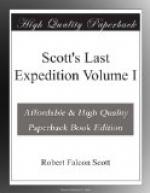We may be said to have entered the pack at 4 P.M. on the 9th in latitude 65 1/2 S. We left it at 1 A.M. on 30th in latitude 71 1/2 S. We have taken twenty days and some odd hours to get through, and covered in a direct line over 370 miles—an average of 18 miles a day. We entered the pack with 342 tons of coal and left with 281 tons; we have, therefore, expended 61 tons in forcing our way through—an average of 6 miles to the ton.
These are not pleasant figures to contemplate, but considering the exceptional conditions experienced I suppose one must conclude that things might have been worse.
9th. Loose streams,
steaming.
10th. Close pack.
11th. 6 A.M. close pack, stopped.
12th. 11.30 A.M. started.
13th. 8 A.M. heavy pack, stopped;
8 P.M. out fires.
14th. Fires out.
15th. ...
16th. ...
17th. ...
18th. Noon, heavy pack
and leads, steaming
19th. Noon, heavy pack
and leads, steaming.
20th. Forenoon, banked
fires.
21st. 9 A.M. started. 11 A.M.
banked.
22nd. ,,
,,
23rd. Midnight, started.
24th. 7 A.M. stopped
25th. Fires out.
26th. ,, ,,
27th. ,, ,,
28th. 7.30 P.M. steaming.
29th. Steaming.
30th. Steaming.
These columns show that we were steaming for nine out of twenty days. We had two long stops, one of five days and one of four and a half days. On three other occasions we stopped for short intervals without drawing fires.
I have asked Wright to plot the pack with certain symbols on the chart made by Pennell. It promises to give a very graphic representation of our experiences.
’We hold the record for reaching the northern edge of the pack, whereas three or four times the open Ross Sea has been gained at an earlier date.
’I can imagine few things more trying to the patience than the long wasted days of waiting. Exasperating as it is to see the tons of coal melting away with the smallest mileage to our credit, one has at least the satisfaction of active fighting and the hope of better fortune. To wait idly is the worst of conditions. You can imagine how often and how restlessly we climbed to the crow’s nest and studied the outlook. And strangely enough there was generally some change to note. A water lead would mysteriously open up a few miles away or the place where it had been would as mysteriously close. Huge icebergs crept silently towards or past us, and continually we were observing these formidable objects with range finder and compass to determine the relative movement, sometimes with misgiving as to our ability to clear them. Under steam the change of conditions was even more marked. Sometimes we would enter a lead of open water and proceed for a mile or two without hindrance; sometimes we would come to big sheets of thin ice which broke easily




